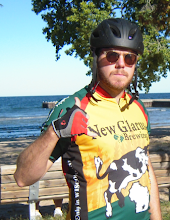My 'Profile Writing' assignment for class:
He was already seated by himself in a quiet bar, in the striking inverse shadow of a lit-up
When choosing our interview spot, the 25-year old
His head full of spikey, dark brown hair was bent over a black laptop computer. Atop his bright orange t-shirt emblazoned with a company name, the computer’s supplier, he looked like an absurd PEZ dispenser. A strange description, but not quite so much as his action here: working outside of office hours.
The Dutch are supposedly known for keeping their 40-hour work week well in check. He may be an exception, but perhaps working late is how to keep a decent job in
Dutch Limburg has been experiencing both significant ‘brain-drain’ and ‘ont groening;’ both educated individuals and not necessarily educated youth are all leaving the province. He is part of the former. He loves where he’s from – he just couldn’t get going there economically. The Dutch government is neglectful, and the Dutch public, disrespectful.
His old apartment was ten minutes from
Not directly harmful,
At home he speaks a dialect, a mixture between Dutch and German, almost unintelligible to either. ‘Dutch started as a dialect of German and what we speak is still stuck at that phase of being somewhere in between the two,’ he humbly explains. From social interactions prior to this interview, I actually thought he was German. ‘Many people do,’ he jokes, still with an air of pride.
Members of each town have their own version of dialect, changing about every ten minutes by car. Locals can detect slight differences from around the province but he feels a special kinship regardless, as long as you’re speaking the language. ‘Even if you’re being pulled over by the police - if they speak dialect and you do, you’re probably fine,’ he says.
Dialect may not be as strong a unifier as ideology a divider, he observes. ‘For every Dutch-German marriage - two people that met in a bar or club on either side of the border - there’s been huge fights, almost like battlefields between young Dutch Socialists and Germans on the Right. But Limburg has Neo-Nazis as well as
But he still regularly visits his hometown. The warmth of his boyish face is genuine as he describes it, for better or worse. ‘It’s where I grew up. It’s where my family has been for a long time. It’s nice to speak dialect with people who have spoken it from birth, and not be mocked by people who happen to overhear you.’ The waitress brings him another Murphy’s. He shoots her a wide and true grin and he thanks her, in proper Dutch.





First graf is cut off. :-/
ReplyDeletedamn. sometimes i really don't like blogger.
ReplyDeletetake that, formatting demons!
ReplyDelete